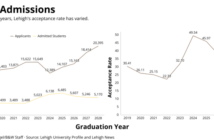While Lehigh’s policy of requiring a leave of absence from the university for extended study abroad periods (of at least one semester) in countries on the US State Department Warning is not controversial, many feel that an exception to the policy should be made for students traveling to Israel, a frequent destination for students taking semesters abroad, both at Lehigh and elsewhere.
Lehigh’s policy is based on the recommendations of the International Travel Advisory Committee, which has no formal decision-making power. The committee was started by Provost Patrick Farrell in 2012 in response to concerns over students traveling to Haiti, according to Jennifer Jensen, deputy provost of Academic Affairs and director of the committee.
The recommended policy requires a student who wishes to spend at least one semester in a country on the state department travel advisory list to file with the Committee on the Standing of Students to take a leave of absence from the university. Taking a leave of absence means that a student is technically not considered a Lehigh student during his or her semester or year abroad, and he or she must apply for readmission before registering for classes for the following semester.
However, unlike most instances of leaves of absence during which a student cannot take courses for credit, a student may receive credit for courses taken abroad in this situation.
Sammi Greene, ’16, a joint international relations and modern languages and literature major, was approved by the SOS Committee to take a leave of absence to go to Israel. She said the next steps are to get approval from department chairs for the courses she intends to take next semester and to file paperwork with the Dean of Students’ office regarding her leave of absence, completing a process that entails far more paperwork than the typical study abroad student.
Chaim Kaufmann, associate professor of international relations and interim department chair, will advise Greene through the process and said she must take the additional step of getting courses approved specifically as transfer credits upon her return to Lehigh. Typically, other students who go abroad must gain course approval from the registrar and have the credits automatically count toward graduation (so long as the courses were approved and their grade requirements met).
In the unlikely event that Greene’s transfer credits are denied, they would be considered ex-post, hence ineligible for appeal. Jensen said this is necessary for programs that are one semester or longer because, unlike short-term programs, longer programs present some difficulty. She said the International Travel Advisory Committee considers a student’s itinerary and the safety of the region during the period in which they are traveling, in addition to other factors, when determining whether a student’s credits will transfer.
“Students have a lot of flexibility with where they can travel, and you might expect that their travel arrangements might change over the course of a semester or year,” Jensen said. “So the committee is not really in a position to get a complete itinerary or completely vet that.”
Jensen stressed that the process is completed with students’ safety in mind, which is the university’s main priority, and compared the situation to the process a faculty member would experience if they wished to engage in research involving human subjects.
However, the objection to this approach lies not with the policy itself, but with the lack of flexibility toward Israel, which the International Travel Advisory Committee feels is safer than other “warning” countries.
Kaufmann, a proponent of changing the policy, said the lack of flexibility is unjustified given the fact that, notwithstanding its place on the travel advisory list, Israel is quite safe and that many of Lehigh’s peer institutions have made policies that treat Israel differently from the other countries on the travel advisory list.
In the fall of 2013, Kaufmann, along with adjunct Hebrew professor in the department of Modern Languages and Literature Bunnie Piltch and Martin Kafka, then-director of the Berman Center for Jewish Studies, met with Jensen to address the policies of other institutions and the fact that not all travel warnings are alike.
“In my opinion, one, we should conform better to best practice to peer and aspirational peer institutions,” Kaufmann said. “Two, we should find out how people deal with the waiver problem. Three, we should put in place a structure for providing ITAC guidance on what these travel warnings actually say.
“We should treat them on the basis of actual information, not the mere existence of the document,” Kaufmann said. “And fourth, we should avoid the appearance, which is being created by the current policy, that the policy has the effect of discriminating against Israel, maybe not solely, but more that is justified.”
He showed these differences in a document he had prepared for the meeting, comparing the differences between Lehigh’s policy and those of the 18 aspirational institutions as designated by the Board of Trustees and four peer institutions in Pennsylvania.
Of these institutions, 13 schools, including Harvard, Yale, Lafayette, Washington University in St. Louis, Vanderbilt and Cornell, allow students to travel to Israel through a pre-approved program, which Jensen said could entail a similar process to the International Travel Advisory Committee.
Other institutions with similar policies include Muhlenberg, which requires students to sign waivers stating that they understand the risk of going to a travel-warning country. At Johns Hopkins University and the University of Virginia, a student can petition to go to Israel without taking a leave of absence.
“Why are we so out of step? Why are we reinventing the wheel when lots of our peer and aspirational peer universities, have dealt with this problem?” Kaufmann asked. “Why are we so concerned about liability when there are obvious ways of dealing with that, that other universities have used, and we ourselves use even for less fraught things? Why would ITAC adopt a blanket policy that ignores that actual content (of travel warnings?)”
Jensen said a waiver may be insufficient in warning students and absolving the university from responsibility or ensuing litigation, nor should it prevent the university from caring about the safety practices of students.
Travel warnings do indeed often vary in terms of content. The one for Israel, issued on Sept. 10, says that while many of the major cities in Israel, such as Tel Aviv and Haifa, have safety situations that are comparable to or better than those in other major global cities, students should be wary of protests in Jerusalem, the West Bank and occasional sporadic gunfire in the North near the serious border. It also advises individuals not to visit the Gaza Strip, though Americans are not permitted to travel there anyway.
To that end, Kaufmann and other faculty have proposed the formation of a new faculty committee because the International Travel Advisory Committee is comprised only of administrators. This new committee would be specifically charged with reviewing travel warnings and making recommendations based on their findings.
Kaufmann said he fears the knowledge of Israel’s policy, as compared to other institutions, could be harmful to the students and harmful to Lehigh’s efforts to recruit students. He even said these differences have repeatedly spurred a sentiment among students, many of who have told him they believe the policy is anti-Israel and anti-Semitic.
“I had to jump hoops and ladders only to be told I would have to keep petitioning and finally, after months of writing letters and filling out paperwork again and again, they told me it wouldn’t happen without taking a leave of absence, which I didn’t feel comfortable doing,” said Sarah Siegel, ’14.
Siegel said she ultimately had a great experience while studying abroad in Australia, but said she would have benefited from studying in Israel and would have taken a leave of absence had she known it was less serious than she had previously believed.
“It shows ignorance on the part of the administration,” Siegel said. “So many other amazing universities encourage students to go abroad to Israel for the incredible opportunity to be in such a unique culture, whereas ours prohibits it purely based on some faulty general notion that is based on media perception with no roots in reality.”
Jensen denied that the policy is specifically targeted toward Israel, but rather said it applies to all travel-warning countries. Because it relates to Israel, the fact that the travel warning says some areas are safer than others essentially gives sufficient reason to maintain the status quo, for the university cannot be certain where in the country students may travel.
Gabby Drucker, ’15, and Sophie Kravet, ’15, both of who took leaves of absence last spring to study abroad in Tel Aviv, said they found the help from the Study Abroad Office and others with whom they had to work marginal at best. They both said they had to show great resolve and individual initiative to see the process through to the end.
“They really didn’t want me going, so if I had stopped applying and stopped petitioning them, it would have been very clear that I couldn’t go,” Drucker said.
Kravet said Lehigh really tries to get students not to go to Israel. She said she recalls the Study Abroad Office encouraging her to explore other options.
“Why are they pushing students not to go? That, I think, is the question,” Kravet said.
Drucker and Kravet said they feel the policy does not accurately reflect conditions on the ground in Israel. They both said they felt safer walking around Tel Aviv at night than they do in New York City.
Drucker said her friends who attend institutions that do not requires leaves of absence were “absolutely mindblown” when they heard about Lehigh’s policy.
However, both Greene and Illana Marks, ’16, who are in the process of applying to go to Israel, said they felt the offices thus far have been very helpful and did not deter them from applying. Greene, however, said she made it clear that she had to travel to Israel because of her major’s requirement to study abroad in the language she studies. For her, that’s Hebrew.
Marks said she was pleasantly surprised at their helpfulness.





Comment policy
Comments posted to The Brown and White website are reviewed by a moderator before being approved. Incendiary speech or harassing language, including comments targeted at individuals, may be deemed unacceptable and not published. Spam and other soliciting will also be declined.
The Brown and White also reserves the right to not publish entirely anonymous comments.
2 Comments
Thanks for covering this issue. For what it’s worth, a travel warning doesn’t usually trigger an automatic prohibition of credit transfer – this is extreme. Keep us updated!
This is great! When I was a student (3 years ago) I was told to leave the study abroad office if I wanted to study in Israel and that it was impossible. I then transferred out of Lehigh because of the bias and ridiculous way they treated this.